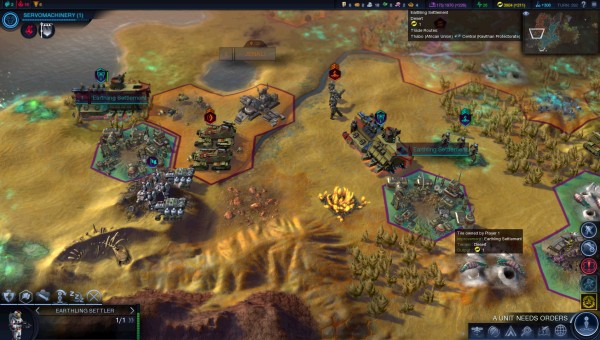
Imagine Civilization V set in a futuristic world in outer space. That is the simplistic description of Civilization: Beyond Earth, except that the sci-fi theme makes this turn-based strategy game a lot more interesting and strategically challenging.
Roaming aliens with indeterminate intentions, noxious miasma that damages your units over time, impassable crevasses and daunting landscapes all add to the challenges you face while settling in a new planet.
You will encounter a good variety of local flora and fauna including Alien Sea Dragon, Siege Worms, Wolf Beetles and even the seemingly inert Kraken.
Civ V veterans, be warned that the strategies you employed successfully in Civ V may not work well for Beyond Earth, so be ready to get a few humbling lessons in the first few attempts.
Initially, I played it like I would with Civ V – attacking native aliens with impunity and clearing out their nests, thinking I was doing everyone a favour.
Suddenly I get complaints from my neighbours to stop killing aliens. By doing more research on aliens, I realised that I could actually improve my own species while improving my relationships with the aliens.
Beyond Earth maturely deals with complex topics such as colonisation, assimilation and survival of species, both native and alien. Indeed, humans may now be the aliens from the perspective of the native creatures.
Sounds like the Alpha Centauri, the Sid Meier classic hailing back from 1999? Well, not quite. The premise is similar but the gameplay is different.
Beyond Earth feels a lot like Civ V in terms of how the game is laid out. You get maps with hexagons, on which colonists expand by setting up outposts and growing into cities.
Along the way, you develop your people via technology, culture and construction points, with specific buildings in your cities bestowing your civilisation with bonuses.
Expansion in Beyond Earth is slower due to higher costs and risks, which penalise those who are fond of spreading themselves too thin too quickly.
I personally enjoyed Beyond Earth more than Civ V as it adds replayability by way of different bonuses, depending on which civilisation you select, and how you level up through the extensive and intimidating tech tree and which virtues you choose to develop.
There is also plenty to explore, such as seeking out rewards on crashed pods, cleaning out alien nests for research points and exploring alien relics. Interwoven with science fiction themes and futuristic technologies and being free from historical bias and context, Beyond Earth is an intriguing and engaging game.
Yes, there are still the inter-faction relationships and diplomacy you need to navigate, like espionage, trade and political cooperation agreements, but Beyond Earth introduces an additional complexity by way of affinities like Purity, Supremacy and Harmony that affect your unit upgrades and how other civilisations react to your actions.
In addition, there are also quests to perform that can lead you to gaining additional insights into the game, and you have a choice on what rewards you want to receive – health, production or research points.
As your civilisation advances, you can also build futuristic wonders like the Stellar Codex that increases the cover provided by your orbital satellites, or the rather hippie-sounding Mind Flower that maxes out the Harmony affinity of your civilisation with the alien lifeforms.
As with Civ V, I find Beyond Earth better enjoyed in a single player mode, as there have been connection issues for multiplayer sessions.
For those looking to play with friends online, the inevitable path of warfare and destruction makes it less fun than a long drawn single player campaign. Especially so, for those who prefer peaceful exploration and expansion while pushing their civilisation to greater advancements and wonders.
If you are fond of the sci-fi genre, strategy games and are looking for a more engaging “one more turn” alternative over Civ V, you cannot go wrong with Beyond Earth, which is going for S$61.90 in Singapore.
Just be prepared of a bit of a learning curve, but I feel the rewarding gameplay is well worth the time.






